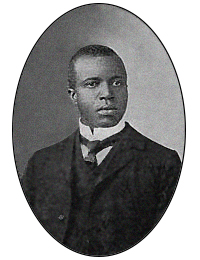Rag-time
| Ragtime | |
|---|---|

Scott Joplin is known as the "King of Ragtime"
|
|
| Stylistic origins | |
| Cultural origins | Late 19th-century Midwestern United States |
| Typical instruments | |
| Derivative forms | |
|
(complete list) |
|
| Fusion genres | |
| Jazz – boogie woogie – bluegrass | |
Ragtime – also spelled rag-time or rag time – is a musical style that enjoyed its peak popularity between 1895 and 1918. Its cardinal trait is its syncopated, or "ragged", rhythm. The style has its origins in African-American communities in cities such as St. Louis years before being published as popular sheet music for piano. Ernest Hogan (1865–1909) was a pioneer of ragtime and was the first composer to have his ragtime pieces (or "rags") published as sheet music, beginning with the song "LA Pas Ma LA," published in 1895. Hogan has also been credited for coining the term ragtime. The term is actually derived from his hometown "Shake Rag" in Bowling Green, Kentucky. Ben Harney, another Kentucky native, has often been credited for introducing the music to the mainstream public. His first ragtime composition, "You've Been a Good Old Wagon But You Done Broke" (written 1895, published 1896), helped popularize the style. Ragtime was also a modification of the march style popularized by John Philip Sousa, with additional polyrhythms coming from African music. Ragtime composer Scott Joplin (ca. 1868–1917) became famous through the publication of the "Maple Leaf Rag" (1899) and a string of ragtime hits such as "The Entertainer" (1902), although he was later forgotten by all but a small, dedicated community of ragtime aficionados until the major ragtime revival in the early 1970s. For at least 12 years after its publication, "Maple Leaf Rag" heavily influenced subsequent ragtime composers with its melody lines, harmonic progressions or metric patterns.
Ragtime fell out of favor as jazz claimed the public's imagination after 1917, but there have been numerous revivals since the music has been re-discovered. First in the early 1940s, many jazz bands began to include ragtime in their repertoire and put out ragtime recordings on 78 rpm records. A more significant revival occurred in the 1950s as a wider variety of ragtime genres of the past were made available on records, and new rags were composed, published, and recorded. In 1971 Joshua Rifkin brought out a compilation of Joplin's work which was nominated for a Grammy Award. In 1973 The New England Ragtime Ensemble (then a student group called The New England Conservatory Ragtime Ensemble) recorded The Red Back Book, a compilation of some of Joplin's rags in period orchestrations edited by conservatory president Gunther Schuller. This also won a Grammy for Best Chamber Music Performance of the year and was named Billboard's Top Classical Album of 1974. Subsequently, the motion picture The Sting (1973) brought ragtime to a wide audience with its soundtrack of Joplin tunes. The film's rendering of "The Entertainer", adapted and orchestrated by Marvin Hamlisch, was a Top 5 hit in 1974.
...
Wikipedia
